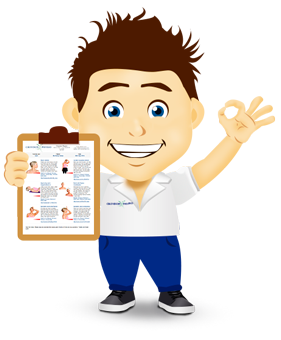
Next steps:
Feel free to read the advice sheet below! To get the full benefit click on 'Start treatment'. By starting the treatment you will get access to weekly rehab programmes online for FREE. You will be able to track your progress, pain levels and we will remind you to do your exercises every day!
What is Long COVID?
Long COVID or post-COVID-19 syndrome is a condition that persists after the initial acute infection. Some people recover over a few days, while others can take weeks or months. It includes ongoing symptoms of COVID-19 (from four to twelve weeks) and post-COVID-19 syndrome lasting twelve weeks or more. There are a possible range of complications which affect multiple organs, leading to metabolic, cardiovascular, respiratory and renal problems.
Who are the people that are most at risk?
Different people have different symptoms brought about by COVID-19. In long COVID, it doesn’t matter if you have been initially hit hard or have mild symptoms when you first contracted the disease. If you still have the same symptoms after twelve weeks, you are most likely suffering from long COVID.
People over the age of 60, immune-compromised individuals, and in some cases, those that needed intensive medical care right after they were infected, will mostly have lasting organ damage and may be prime candidates for long COVID. It is good to note that long COVID as a condition is relatively new and the definition which includes the scope as well as the guidelines, is changing as scientific research and clinical studies are still on-going.
What are the Long COVID symptoms?
You may have the same symptoms that you have had if you were diagnosed initially with COVID-19. You can, however, have new symptoms.
Common symptoms may include persistent fatigue, insomnia, dizziness, loss of appetite, loss of sense of smell and taste, depression or anxiety, aching joints, respiratory issues, brain fog, palpitations, and others. All can affect people’s quality of life, and also affect work.
There are also relationships with psychological stress and emotional stress as well.
The COVID symptom study, run by Professor Tim Spector at King’s College reported that there are two main groups of symptoms: those with shortness of breath, fatigue and headaches, and the second group of those with symptoms of the brain, heart and gut.
What is the Evidence so far?
The Office for National Statistics (ONS) have suggested (from National Survey data) that one in five respondents who tested positive for COVID-19 shows symptoms for five weeks or longer, and one in ten showing symptoms longer than twelve weeks. Danny Altman, a Professor of immunology states that “there are 5-10 million people globally with a long-term condition for which we have no current explanation and no treatment plan”. There is no current information on how long the symptoms last, and it’s too early for researchers and scientists to define the condition.
How is long COVID diagnosed?
Aside from the initial tests to confirm that you were infected with COVID-19, there is no other way to know if you are suffering from long COVID other than the length of time you have had your symptoms or if you are suffering from a condition related to having been infected with COVID-19 after twelve weeks of the onset of symptoms.
What can I do to lower my risk for long COVID?
If you have already been infected with COVID-19, bear in mind that to fully recover from the disease, you need to get your health back as soon as you can. You can do this by boosting your immune system with a balanced nutritious diet. If you are unable to get the nutrients you require from good quality food, then you can supplement. You also need to improve if not get back your physical strength and endurance as soon as possible.
Lastly, maintain a healthy mental and emotional state throughout your recovery. You need to consider the fact that the possibility of these symptoms from having COVID-19 will not only be to your body but also your mental and emotional health. You can achieve a better mental and emotional state by maintaining a positive outlook and if you can, practice a form of meditation like yoga, mindfulness, and deep breathing exercises.
NHS Help
On 15th November 2020, the NHS announced the launching of more than 40 Long COVID specialist clinics bringing a multidisciplinary team of doctors, nurses and therapists to perform physical and psychological assessments on patients.
NICE guidelines provide some recommendations as follows:
- Assessing people with new or ongoing symptoms after acute COVID-19
- Investigations and referral
- Planning Care
- Management, including self-management and supported self-management and rehabilitation
- Follow-up and monitoring
- Service organisation
- Recommendations for research

